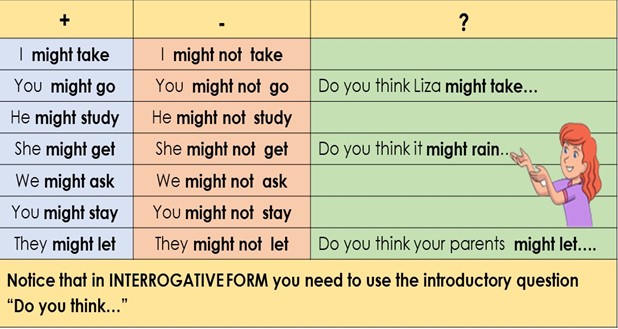I. IS “MIGHT” A MODAL VERB?

Definitely! But what are “modal verbs” exactly? Are they different from “Auxiliary verbs like Do-Does-Did- etcetera”?
Modal verbs are different from auxiliary verbs and from the rest of verbs because they carry a special meaning or intention, added to main verbs. They are very easy to use because they always keep the same format for all subjects (I might, she might, they might); that is, they do not take up a conjugation, and they are always followed by a verb in base form (I might see him, she might go, they might arrive). In general, MIGHT or its negative form MIGHT NOT, (you do not use a contracted form in the negative), is a modal auxiliary that is used to express an unlikely or uncertain possibility.
Here are some examples:
- Melissa might be late for the meeting tomorrow. She hasn´t been feeling well lately and she needs to go to the doctor in the early morning.
- You should take your coat with you, Dad. It looks like it might snow this evening.
- My boss might not go to the Monterrey Conference next week. He isn´t sure yet.
- There might be some pizza left over in the fridge, Mike. I´m not too sure.
- We might visit our grandparents in Acapulco this weekend, but it depends on the weather.
- Jackie might come to her sister´s wedding next month, but she isn´t sure yet. It depends on a loan she wants to get.
- We might go to the Book Fair on Sunday, Monique, if you want to come.
II. IS “MAY” A MODAL VERB FOR POSSIBILITY TOO?

That´s right. You can also use MAY/ MAY NOT instead of “might” to express a weak possibility or certainty. Here are some examples.
- My colleagues and I may have a meeting tomorrow afternoon, if we finish our project on time.
- Sorry, I may not be able to go to your party in Cabos next Saturday. I have an important exam coming up soon and I need to study.
III. KEY POINTS TO KEEP IN MIND
We often use expressions such as “I´m not sure” “I haven´t decided yet” “she isn´t sure yet” etc., to indicate an unlikely or an uncertain possibility. In terms of its language pattern, look at this chart:

IV. CONSOLIDATION
V. EXERCISE I
LANGUAGE USE PRACTICE
MODALS FOR POSSIBILITY
Choose the correct answer to complete the following sentences correctly.
VI. READING COMPREHENSION AND VOCABULARY BUILDING

SKILLS YOU ABSOLUTELY DON’T NEED ANYMORE WHEN APPLYING FOR JOBS
Searching for your next career opportunity takes time and energy. Knowing which skills you absolutely don’t need anymore when applying for jobs can help you sharpen your focus and prioritize your time. It is actually less about knowing which skills you don’t need and more about knowing which skills you don’t need to point out that you have because they’re now so common that it’s obvious to those doing the hiring that any modern job seeker will have them. Kicking certain unnecessary or obsolete skills off of your resume can also streamline the hiring process and help you stand out among a sea of applicants. A hiring manager doesn’t want to wade through a list a mile long under the skills section of your resume to seek out the things that actually matter in the position that you’re up for.
Think of them as skills that are now so ingrained into our everyday lives that they are basically expected of all applicants. Where knowing how to navigate Microsoft Office used to be a specialized workplace skill, it’s now common knowledge for your average high school student. The oft-quoted words of Bob Dylan definitely ring true here — “The times, they are a-changin.’” Take a look at which skills you don’t need to waste any more time focusing on during your job search.
(SUBHEADING 1)
As previously mentioned, knowing how to operate a Word document or navigate a spreadsheet is now more common knowledge than it is a specialized skill. It may be tempting to continue to list your proficiency in these computer applications on your resume, but it’s an outdated piece of information at this point in time.
(SUBHEADING 2)
It used to be true that the ability to research something was an actual skill, rather than something that was easily achieved with a few mouse clicks. The research involved digging through books and knowing where to look and who to talk to. Today, unless you are looking for a job that specifically requires research above and beyond a simple web search (academic research is one example) you don’t need to list research as a skill on your resume when applying for jobs.
(SUBHEADING 3)
This is another one of those skills that an employer will assume you already possess. It is common for most people to have a personal account and therefore know how to send and receive email communication. In fact, you are likely using one in some way to apply for the job — whether by emailing your application directly or submitting your application in an online system that requires an email for use.
(SUBHEADING 4)
Depending on what industry you are in, you might be tempted to include certain skills on your resume that you have experience with which may actually be outdated. For example, computer programmers who spent years mastering now-archaic coding languages should focus instead on only including tech skills on their resume that are relevant to more modern and widely used coding languages.
(SUBHEADING 5)
Operating a multi-line telephone system used to be something that employers looked for. It was considered to be a true skill to manage multiple lines and transfer calls. Today, digital systems make this entire process much easier, and it’s generally accepted that if you’re applying for any sort of job, you know how to use a phone. This is definitely a skill that your resume can do without.
PRACTICE I.
PRACTICE II.
INSTRUCTIONS_Questions 6-15
Choose a, b or c to complete the following sentences correctly.
PRACTICE III
BIBLIOGRAPHY
Azar, B. S., Azar, D.A., & Koch R.S. (2009). Understanding and Using English Grammar. Longman.
Barker C. and Mitchell, L. (2004). Mega 1 (First Ed.). Macmillan Publishers.
Hewings, M. (2013) Advanced Grammar in Use with Answers: A Self-Study Reference and Practice Book for Advanced Learners of English. CUP
Murray, L. (2014) English Grammar. Cambridge University Press.
WEB RESOURCES
Images 1 & 2 _ Personal subscription to Pixton
REFERENCES
Chart 1_Own source .
Image in Chart 1_ https://www.freepik.com/free-vector/smiling-boys-girls-pointing-banners-blank-empty-posters-sheets-paper-with-copy-space-set_22655987.htm#query=cute%20characters&position=40&from_view=keyword
CREDITS
- (2021) Practice exercise written by Connie Reyes_Language Department at ENES-LEON UNAM
- Audio version performed by Sally and Matthew_Voicemker_Text to Speech Converter_Connie Reyes 2022 Subscription
- (2021) Practice exercise written by Connie Reyes_Language Department at ENES-LEON UNAM
- Story by Ashley Jones. Published on Augusto 19, 2020. Text retrieved and adapted from https://www.theladders.com/career-advice/the-skills-you-absolutely-dont-need-anymore-when-applying-for-jobs
- (2021) Practice exercise written by Connie Reyes-Cruz_Language Department at ENES-LEON UNAM
- Audio version performed by Sally-Matthew_Voicemker_Text to Speech Converter_Connie Reyes 2022 Subscription
- Free stock photos_ https://www.pexels.com/es-es/foto/ligero-mujer-taza-ordenador-portatil-4050439/Photo by pexels-vlada-karpovich-4050439